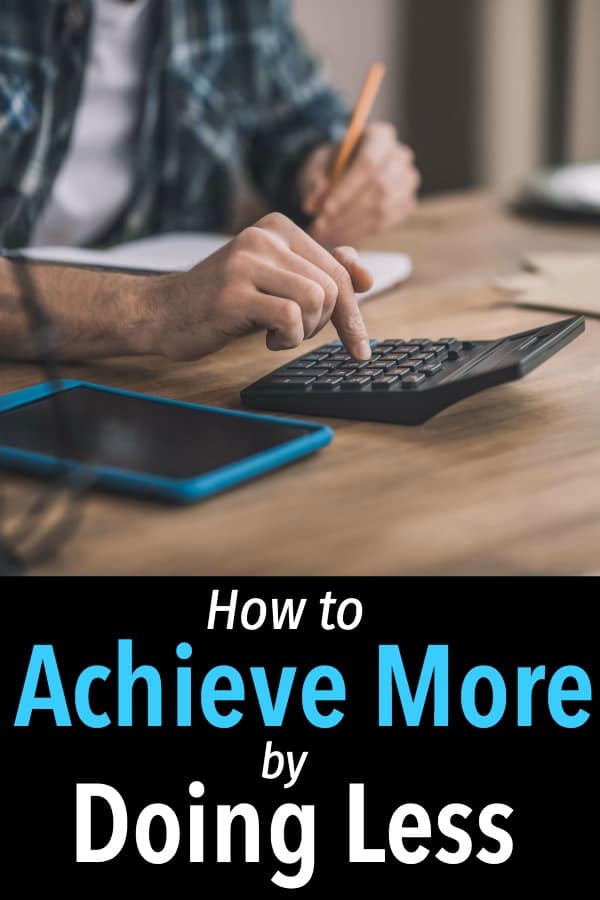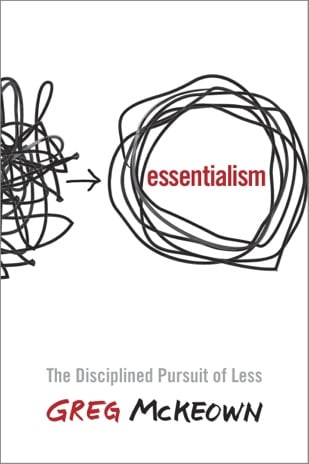“This post may contain affiliate links. Please read my disclosure for more info.
Do you reach Sunday nights wondering how the weekend went by in a blur? Does the idea that you’ll be back on the road in 12 hours make you want a weekend do over?
Do you feel overworked and underutilized at your job, never really able to focus on your skill because each day is filled with meetings, phone calls and “urgent situations”?
Overall, are you doing the things you’ve wanted to do in life, or is there never enough time?
If you can never find the time to devote to the things that inspire you, this could be a wake-up call.

Because the number one regret of people at the end of life, is this exact feeling; that you’ve lived your entire life this way. Always fulfilling other people’s expectations, oblivious to the passage of time, and never having the chance to live the life you wanted.
What if you could do less, and achieve more? And what if you could end your weekends feeling refreshed and satisfied that your time was well-spent?
Essentialism is about being more intentional about what you say yes to. It’s about recognizing that we have more choices available to us than ever before. And when we commit to too many of them two things happen:
- We do a mediocre job at a bunch of things we’re not that crazy about.
- When something comes along that we are crazy about, we have to pass on it because we’re committed to so many other meh things.
Warren Buffet and Steve Jobs didn’t use the term Essentialism, but they’ve both said that a big key to their success wasn’t necessarily the projects they said yes to, but the dozens they said no to.
They weren’t unwilling to listen to new opportunities. They were just insanely selective about the ones they’d commit their time to.
Greg McKeown picked up on the idea in his book “Essentialism – The Disciplined Approach to Less”. He says Essentialism is about challenging the notion that “we can have it all”.
Because simply, we can’t. And when we try to, we’re left feeling overwhelmed and unfulfilled

McKeown says,
“There are way more activities and opportunities facing us than we’d ever have the time to invest in. A lot of them may be worthwhile, but most aren’t.”
Essentialism isn’t a new time management tactic that’ll help you to get more done.
It’s a mindset to use when you’re faced with decisions on anything from your career, to what to do this weekend.
McKeown says “we can get so inundated with options that we actually forget, or become numb to our ability to choose the one that’s right for us“.
Table of Contents
How Can We Lose Our Ability to Choose?
One way we eventually realize we’re in a situation we’d never have chosen, is by the sheer information overload coming at us every day.
As you read this, your phone probably updated a few times with texts, emails or tweets. Maybe the TV’s on, and you’re reading and watching simultaneously.
Walk along any street, through an airport, or even along the beach. How many people seem present in the moment, and aren’t focused on their phone?
There’s a barrage of input around us, and if we don’t choose to shut it off once in a while, the constant demand of attention is mentally exhausting.
We forget what it’s like to live in the moment. And when our mind is stimulated every minute, there’s no time to think, and be creative.
Without shutting off the fire hose of information coming at us, it’s easy to confuse what everyone around us wants, and what we’re told we should want, with what we alone need.
Another way we can lose our ability to see what’s right for us is through “learned helplessness”.
Here’s an example:
Suppose you feel stuck in your job. You haven’t been promoted in 5 years and don’t see it happening anytime soon. So you start volunteering and saying yes to everything under the sun.
Now you’re running in 6 different directions but making little progress in any of them.
Maybe your boss throws you a compliment now and then for working hard, but do you go home at night feeling accomplished? Probably not.
Or maybe you respond by giving up. You show up, multi-task through each day, collect your paycheck and suffer in silence.
You’re confused and frustrated. You deserve more. But what you need, is to be able to focus on the few tasks that’ll move the ball forward each day.
If not there, then somewhere else.
How Essentialism Saved Apple Computer
Steve Jobs was ousted from Apple in 1985, and returned in 1997 when he was named interim CEO. Apple was in crisis mode at the time. Their product line had become bloated, and in the last quarter of 1996, sales had sunk by 30%.
One of the first things Jobs did, was to slash the product line by 70%. His strategy was to produce only four products, and put a much greater focus on quality and innovation.
“People think focus means saying yes to the thing you’ve got to focus on. But that’s not what it means at all. It means saying no to the hundred other good ideas that there are. You have to pick carefully. I’m actually as proud of the things we haven’t done as the things I have done. Innovation is saying no to 1,000 things”. -Steve Jobs
And saying no to the things that didn’t matter paid off. During the first fiscal year of Job’s return, Apple lost $1.04 billion, and according to him, they were 90 days from insolvency. The following year, they turned a $309 million dollar profit.
How We Can Filter it all Out
Your neighbors are going snorkeling in Grand Cayman next month. Your friend is investing in a rental property. And your coworker is applying for a position at the new company across town.
But wait, what about you? Shouldn’t you be taking advantage of those opportunities? You deserve it too, right?
Derek Sivers said your criteria for devoting your time and money on something should either be “hell yea“, or “no”. Nothing in between.
Because if you keep reaching for the kinda cool stuff – the stuff that people around you are doing, you’ll miss the awesome, once in a lifetime, hell yea opportunities – the ones right for you.
Have you taken the time to figure out the 1 or 2 most important goals for your next few years?
If you haven’t, you might feel yourself being drawn to spend your time and money on the things other people want.
And chances are, months or years down the road you’ll wonder why you feel overworked and unfulfilled. You’ll remember promises you made to yourself years ago that you never pursued, and wonder why.
You may have heard one of Warren Buffet’s thoughts on success:
“The difference between successful people and really successful people is that really successful people say no to almost everything”.
That doesn’t mean he automatically rejects almost every opportunity. In fact, the method he suggests using for your career is to make a list of your top 25 goals. Then circle the 5 most important ones. And now cross off the other 20. The 20 will be done in time, he says, but right now they’re just distractions.
You can try this now:
- Write 5 personal goals you’d like to accomplish over the next year. Now circle the two that’d have the most impact.
- Write 6 things you’d like to do this weekend. Now cross off 3 (or reschedule to another day).
- Write 3 work goals you’d like to accomplish tomorrow. Now, which one will make the most difference?
Why Should You Care?
So Warren Buffet filters out stock offerings and business opportunities to eliminate all but the essential. And Steve Jobs chose to design only a handful of products.
But can their methods of weeding out all but the essential business opportunities really help you and I in our personal life and on the job?
The idea of Essentialism, or drilling down on the things that matter most, reminded me of two stats that seem related. The first is financial, and the second is personal.
According to Career Builder 78% of people live paycheck to paycheck their entire life.
Almost 8 in 10 people have no emergency fund and couldn’t pay for a sudden expense like a car repair.
Granted, we all have tough times at some point in our life. But when such a large percentage of hard-working people live paycheck to paycheck their entire life, it makes you wonder…
How many of us regularly use a budget that helps us to separate the non-essential (for us) from the essential?
We have dozens of choices coming at us every day, all competing for our paycheck. Everything from our home, to our car, what we wear, and how we entertain ourselves are all presented to us as “essential”.
Without one or two personal goals for the next couple years, it’s hard to sift through everything and choose just the things that make the most sense for us at any given time. So we end up over-committing and in never-ending debt.
And the second stat…
People often live their entire life, never pursuing what matters to them.
I mentioned the regret people have at the end of life after decades of putting your own dreams on hold in favor of other people’s expectations.
Palliative nurse Bronnie Ware documented that in her book, The Top Five Regrets of the Dying after interviewing patients in the last weeks of their life.
Why wouldn’t someone live the life they wanted?
I’d bet if you asked 50 people in their 30’s and 40’s whether their current career aligns with what they truly feel they were meant to do, the majority would probably say no.
And many of them probably have a mortgage to pay, a big car payment, and several thousand dollars of credit card debt. Getting some training to move to a more fulfilling line of work would require money that’s already committed to a mountain of debt.
And after work, their schedules may be full with yard work, the gym, the PTA meeting or their kid’s track meet.
Having no money and no time is a trap we think is temporary.
Until you realize that two decades have slipped by, and you still haven’t taken that trip you promised yourself. You’re still at the job you can’t stand. And you’re still unable to save money because of the house full of furniture you’re paying off.
So, practicing essentialism isn’t the same as being frugal. It’s not about settling for less than what you deserve.
It’s about carefully defining the few most important things,you want to see happen in your career or personal life. Then using them as your measuring stick to filter out the things that don’t help you move in that direction.
Or as David Allen says, “You can do anything, but not everything”.
How about you? Do you feel like you’re spread in so many directions that few of them bring value into your life?
How could you do less and achieve more?



